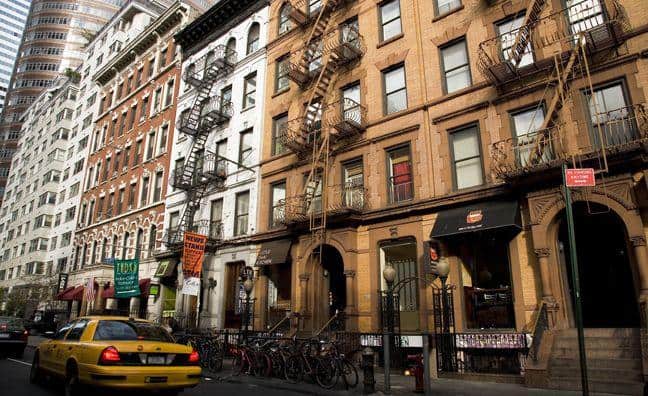NYC Landlords Say New Laws Designed To Protect Renters Preventing Them From Maintaining Their Units

Some landlords say now they simply don’t have the money to renovate certain apartments, instead keeping them vacant or in poor shape, CBS2’s Lisa Rozner reported.
Rozner saw one apartment in the Bronx on Monday that was down to the sticks. Everything was ripped out as part of plans to renovate, but landlord Oscar Perez put a hold on it after Gov. Andrew Cuomo signed new rent laws in June. Previously, a roughly 20-percent rent increase could be added when a unit was vacated, and owners could add additional increases to the rent for upgrades made to the apartment.
Now, those rules are gone.
“I can’t count on money to come in because there’s no chance to recover it from anybody. No tenant will be able to pay me for it in a rent increase or as a vacancy allowance that would help me recoup some of it,” Perez said.
Like most rent-stabilized buildings, the one Rozner saw dates back to the early 1900s, and the recently vacated apartment hadn’t been touched in over a decade.
Perez said two of his 20 units on Hoe Avenue in the Morrisania section of the Bronx are vacant.
When asked if he’s worried at all about being accused of warehousing, Perez said, “Well, you could accuse me, but in reality I’m not warehousing. I just don’t have the money to finish it.”
He said he had spent $45,000 on work until the law passed.
Mold is another problem in these old buildings and while inspecting a newly vacant unit, Perez found it behind a wall. He said that repair will cost around $5,000 alone.
Under the new law, landlords can still pass off money spent on upgrades in the form of a rent increase, but only on a limited basis. For instance, Perez would have increased the rent on one apartment about $100, from $830 a month to $930, but he said he might be able to increase it $10 due to the new law.
“It’s a knife through the heart of landlords, private building owners who need the money to exist, to pay their real estate tax, to pay their employees and to buy things from the local suppliers,” Perez said.
Landlord Stephanie Kirnon said her rental income after costs was $17,000 last year, yet she needs double that to fix her roof.
“It’s making it difficult to do other improvements,” Kirnon said of the new laws.
Georgia Kromrei, a reporter at The Real Deal, told Rozner some landlords are keeping units vacant on purpose.
“Real estate attorneys have gone on the record to say that keeping rent-regulated apartments vacant may also be a tactic to try and sway lawmakers,” Kromrei said.
So, could vacant units or poorly maintained housing be the future?
“We should definitely listen to and not discount it, but I think it’s really early to say that there’s going to be massive capital flight or a deterioration of all rent-regulated buildings in the city,” Kromrei said.
The bill’s sponsor, state Sen. Brian Kavanagh, said the new law does not prevent landlords from maintaining safe, functional apartments. He said it prevents landlords from taking advantage, making large profits from small investments, and replacing low-income and middle-class tenants with wealthier ones.
“The Housing Stability and Tenant Protection Act eliminated many provisions that allowed landlords to make large profits from small investments, by replacing low-income and middle-class tenants with wealthier ones who would pay double or triple the previous rent,” Kavanagh said in a statement. “Some landlords may be struggling now because they borrowed too much money relative to the rental income they get from their current tenants. But all landlords have an obligation to maintain safe, functional, and habitable apartments for their tenants and the new law does not prevent them from doing so. It continues to provide for annual rent increases based on the cost of maintenance and other factors, as well as additional increases for necessary building-wide capital improvements, and modest improvements to individual apartments beyond ordinary maintenance and repairs. Landlords also receive many tax breaks that boost their profitability. I will continue to work my colleagues in the legislature, city and state agencies, as well as landlords and tenants, to make sure that the new rent laws are properly enforced and that the necessary financial resources are available to sustain housing quality across New York.”
Landlords that spoke to Rozner said only a small minority of owners try to take advantage, and that most try to do the right thing.
Source: newyork.cbslocal.com















 Accessibility
Accessibility